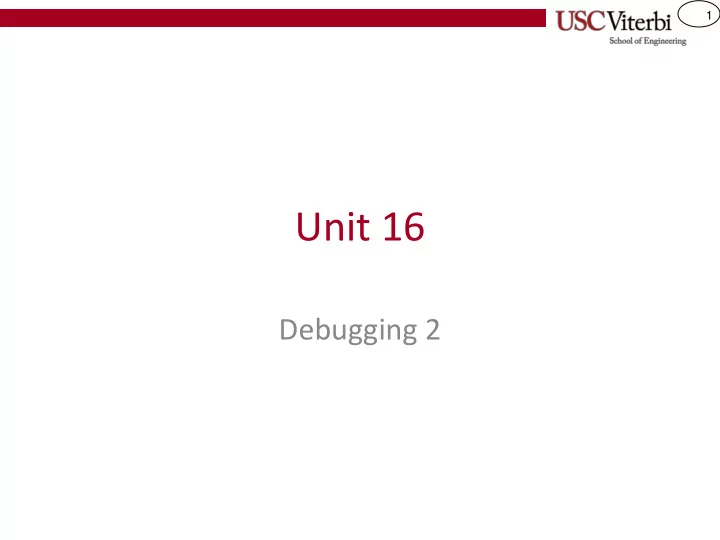

1 Unit 16 Debugging 2
2 PART 2
3 Exercises • Practice "narrating" – search – sumpairs – count – primes
4 Step 4: Using a Debugger • Allows you to – Set a breakpoint (the code will run and then stop when it reaches a certain line of code) – Step through your code line by line so you can see where it goes – Print variable values when you are stopped at a certain line of code
5 GDB and Other Debuggers • gdb is a simple text-based debugger that comes with many Linux/Unix based system – We'll focus on this debugger • Other development environment have built in debuggers – MS Visual Studio – Apple Xcode – Eclipse
6 Running the Debugger • Compile your program and include the -g flag – $ g++ -g search.cpp -o search • Then start the debugger giving it the program you want to debug (not the source code) – $ gdb ./search
7 Breakpoints • Stop program execution at a given line number • Set before you start the program in the debugger – (gdb) break 36 • Get the program running – (gdb) run • It will run and then stop when it reaches the code on line 36
8 Stepping • Type step to execute one line and then stop (aka single-step) – (gdb) step • If you get to a line with a function call that you don't want to go into but just have execute fully, type next (aka step-over) int max(int a, int b) { if(a > b) – (gdb) next return a; ... step } int main() { ... cin >> x; Suppose we are y = max(10,x); cout << y << endl; stopped here next }
9 Printing values • At any point in time you can print a variable or an expressions – (gdb) print size • Would print the value of the size variable – (gdb) print nums[i] • Would print the value in nums[i] – (gdb) print nums[i] == target • Would print true or false
10 Vocareum Exercises 2 • Practice using a debugger – histogram (break at line 8)
Recommend
More recommend